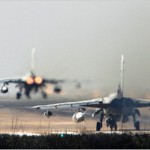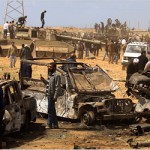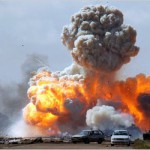Developments in the Libyan conflict moved quickly last week as the United Nations Security Council voted to impose a “no-fly zone” over Libya in order to help rebel forces there, who have had several setbacks at Kaddafi’s loyalist forces and mercenaries have driven them from previously kept rebel strongholds in the eastern part of that country.
President Obama announced that an international coalition led by France, UK, and America would impose the “no-fly zone” as well as target Kaddafi military forces that are targeting civilians. France and the UK took the lead on Saturday by immediately bombing military targets in Libya, including anti-aircraft missile sites and radar installations. In addition, U.S. military warships launched Tomahawk missiles at similar targets.
In less than 10 years now the U.S. has engaged in its third military action in the Middle East, raising questions about the coherence of its piecemeal response to ongoing crises in various Muslim countries as well as its long term strategy for promoting peaceful transitions to democratic regimes. For example, many people are asking why the U.S. is intervening in Libya but not in Bahrain or Yemen where authoritarian regimes have cracked down on pro-reform demonstrators and hundreds of protesters have been killed by military and police forces. On Sunday, demonstrators seethed with rage in Manama, Bahrain as the government tore down the giant tower in Pearl Square, which had become the central battleground, and effective symbol, for protesters demanding democratic reforms.
The problem with asymmetries in U.S. foreign policy in the region was highlighted on Saturday as Defense Secretary Robert Gates announced that imposing a “no-fly zone” in Libya amounted to a war because it would require destroying key military targets, radar, and airfields. He also was skeptical of the usefulness of “no-fly zones,” but claimed that this would be the only limited the step the U.S. would take at this time, warning that no ground troops would be sent in to support the rebel forces. Gates stressed this was a conflict for the Libyans to solve, and that imposing a “no-fly zone” is to protect the mass murder of innocent civilians by loyalist forces of Kaddafi.
The situation in Libya is growing tense. Many fear that if Kaddafi is not deposed soon, the struggle will turn into a long and bloody one for control of different regions of Libya, exacerbating long and deep tribal and clan divisions. The best hope is that the international coalition provide support and aid to the rebel coalition in an effort to defeat Kaddafi’s loyalist forces before bloody civil war becomes a permanent part of Libyans’ lives.


